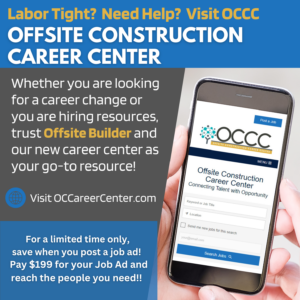Innovation gets a lot of attention in our industry. Automation, AI, robotics, energy-efficient wall panels, BIM-integrated workflows — they’re all important, and they’re the topics that publications like this one love to cover. But in the rush to build faster and cheaper, many forget a truth that cuts across every era and every industry: the only real, lasting advantage your factory has is service.
Anyone with enough capital can buy new equipment. Anyone with a decent team can replicate your wall assemblies, floor systems, or finishes. But service — real, relationship-driven, responsive service — is nearly impossible to duplicate. It’s the heartbeat of every successful modular factory, and in 2025, it’s more important than ever.
We can see this in each of the five stages of a project lifecycle: marketing, design, production, delivery/installation and post-project service.
1. Marketing works best as a two-way street, not a one-way broadcast. “Here’s what we build, here’s how fast we do it,” won’t set your company apart. Great service begins with listening. Salespeople should be more like advisors than order-takers.
A high-performing marketing team doesn’t just post pretty pictures — they build trust, ask questions and make potential clients feel seen before a deal is ever signed. Are you helping developers understand financing hurdles? Are you educating builders on timelines, or are you rushing them to sign on the dotted line?
Great service also includes not pushing a client into a product that doesn’t fit — no matter how hungry the factory is.
2. Design is where service either shines or fizzles out. Your designers are your translators — turning client needs into factory-ready instructions.
Too many modular companies treat design like an inconvenient hurdle. But when you invest in a design team that listens, adapts and communicates clearly with clients and with production, you eliminate rework, frustration and costly surprises.
Want fewer change orders? Want happier clients? Want a smoother production schedule? Make design a premium service, not a bottleneck.
3. Production is more than output: it’s where promises are kept. Factories love talking about capacity, but bragging that “we can build 500 modules a year,” isn’t an advantage unless those 500 are built on time, within spec and without constant back-and-forth.
Your production floor is where the reputation you built in sales and design is either confirmed or destroyed. Timely communication with project managers, real-time updates to clients and careful attention to specs are all service functions, not just operational ones.
4. Delivery and installation are your brand in the field. The set crew, crane operator and field service manager become the face of your company. A flawless factory build means little if boxes arrive late, crews are unprepared, or tempers flare at the jobsite.
Are you treating your set and finish teams as extensions of your service culture — or as afterthoughts? The best factories empower their field teams with the same care they give production teams. It shows.
5. Post-project service is where a lot of modular companies lose their edge. The home is built. The contract is complete. Then the company vanishes — just when the client needs them most.
Warranty calls, touch-ups, or homeowner questions are a nuisance to some — but to the client, they’re everything. Great service means being responsive after the money changes hands. It’s the part the client will remember most when recommending you — or warning others against you.
Service isn’t just about solving problems. It’s about preventing them. It’s about clarity, care, and consistency — from the first inquiry to the final inspection. Someone else will always be cheaper. Someone else will always build faster. But no one can beat you at service if you build your culture around it. In a world where materials, software and strategies can be copied, your only true long-term edge is how you make your clients feel — every step of the way.







